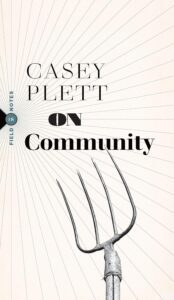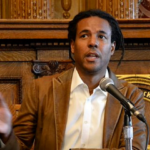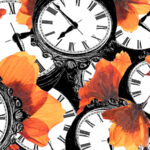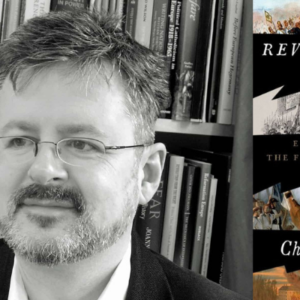Whose Community Is It Anyway?
Casey Plett on how Politicians, Media, and Corporations Co-Opt Language
I had begun to conceive this essay after rereading a magazine interview I’d done months prior. The interview was about my then new book of short stories A Dream of a Woman, and the interviewer had asked me about community. I’m a trans woman, and specifically the interviewer asked about community among trans people, or “the trans community.” I echoed to him something a character says in the book: “that term ‘the trans community’ can mean whatever I want it to mean in that moment.”
The character in question does believe this wholeheartedly. But when I read back those words of mine, speaking for myself as a real-life human, I wondered if I was actually quite that cynical. The magazine had landed on my doorstep in the humidity of summer 2021, in a newly vaccinated Windsor, Ontario, gingerly waking from COVID quarantine. I knew I benefited from community. I was actively reconnecting with community! And Lord knows, I had dearly come to understand how I needed community during the bleak lockdown days.
And when I really started thinking about this, I saw that term community invoked everywhere, in a manner at once authoritative and nebulous, a word that can, indeed, seemingly mean whatever its speaker wants.Yet, I was still frustrated with the concept of community, as I had been most of my life. The drama, the groupthink, the way it turns against individuals it does not understand. Its problems felt intractable, replete with all too human Ouroboros and Gordian knots. I found myself still loath to examine “community” head-on, whether it be in the context of Mennonitism, a small city like Windsor, the neighbourhoods of New York City where I was newly spending the academic year, the Manitoba towns of my childhood, the Pacific Northwest suburbs of my adolescence, or the squabbling, interlaced array of queer communities in which I’d spent much of my adult life.
Community. Just the word itself is so damn amorphous. It can describe everything from a Rust Belt city’s literary scene to a network of Christian denominations to transsexuals bitching about electrolysis pain on the internet to unwieldy political blocs of racialized minorities to internet fandoms to organized hate groups to any homosexual-adjacent person who self-describes with the word gay. Somewhere along the line, such amorphousness had even caused the word community to attain semantic satiation for me—the phenomenon in which a word is repeated so often it loses its meaning; it ceases to sound like a word.
And when I really started thinking about this, I saw that term community invoked everywhere, in a manner at once authoritative and nebulous, a word that can, indeed, seemingly mean whatever its speaker wants.
Like, okay, look at influential forces like politicians, or multinational conglomerates, or even just the media. Netflix advertises the documentary Disclosure: “Leading trans creatives and thinkers share heartfelt perspectives and analysis about Hollywood’s impact on the trans community.” The New York governor says of Black History Month: “A time for all New Yorkers to reflect on the many contributions of the Black community and the ongoing struggle for equality.” I can get off an airplane in Toronto and a bank advertisement on the jet bridge will proclaim the colonial nation-state of Canada “a close-knit community of 36 million.” I can cancel my free Adobe trial and, after alarmingly clingy screens plead for me to reconsider, the confirmation screen arrives: “Casey, you’re still part of the Adobe community.”
On the tenth anniversary of the Deferred Action for Childhood Arrivals program, an ABC affiliate reports: “The undocumented community says its future will remain uncertain until there’s a clear pathway to citizenship.” The US president signs a bill related to gay marriage and praises the then Speaker of the House at the ceremony: “Equality and dignity for the LGBT community has always been her North Star.”A Politico article on a US Senate race: “Herschel Walker rallied with the Indian American community in September . . .” A Wall Street Journal deck on the backlash to a comedian’s jokes: “the company faced strong criticism from the transgender community . . .”
So here we have powerful entities referring to vast, disparate groups of far-flung people and doing so with a mien of authority, with the assumption that when they say “community,” their audience understands what they mean, that nobody’s going to ask for clarification. These powerful entities are also the type whose utterances are usually subject to multiple rounds of review as well as quick public criticism—in other words, if a term would be confusing or get them in trouble, they might not use it. But “community” is invoked without question all the time.
I believe in community. I believe in its necessity. I believe it is deeply and irrevocably meaningful to humanity and to our individual lives. And yet: What do these powerful entities mean?
Take the phrase “the [X] community.” When I read that phrase, I think: How does this person know this about the [X] community? What are the borders of the [X] community? How is the writer deciding who counts within them and who does not? Is the writer a member of the [X] community? Would others dispute their membership? Whatever claim is made about the community, how many sections within it must the claim apply to in order to justify the term? Perhaps most importantly, How can that writer possibly decide who gets to speak for the community? And who are those not speaking in their place?
Now, as a writer, I get it. More specific phrasing than “the [X] community” can get prolix, and the pressure of word economy closes in. Still, my bullshit radar pings.
Take the last of the examples above, “the transgender community.” How would, say, that writer at the Wall Street Journal define it, if pressed? How would I define it if pressed? Certainly, if you asked me off the street, I doubt I’d come up with much beyond: “Goodness, that’s complicated. I don’t know.”
To wit: it’s probably indicative that many queer people to whom I mentioned this essay’s concept reacted with some combo of apprehension, shock, sympathy, and sometimes a deadpan why-are-you-doing-that-to-yourself.
__________________________________

Excerpted from On Community by Casey Plett. Copyright © Casey Plett, 2023. Excerpted with permission by Biblioasis. No part of this excerpt may be reproduced or reprinted without permission in writing from the publisher.




















